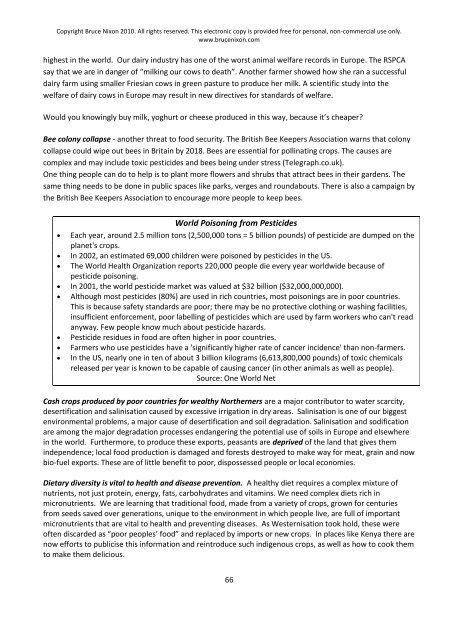A better world is possible - Global Commons Institute
A better world is possible - Global Commons Institute
A better world is possible - Global Commons Institute
You also want an ePaper? Increase the reach of your titles
YUMPU automatically turns print PDFs into web optimized ePapers that Google loves.
Copyright Bruce Nixon 2010. All rights reserved. Th<strong>is</strong> electronic copy <strong>is</strong> provided free for personal, non-commercial use only.<br />
www.brucenixon.com<br />
highest in the <strong>world</strong>. Our dairy industry has one of the worst animal welfare records in Europe. The RSPCA<br />
say that we are in danger of “milking our cows to death”. Another farmer showed how she ran a successful<br />
dairy farm using smaller Friesian cows in green pasture to produce her milk. A scientific study into the<br />
welfare of dairy cows in Europe may result in new directives for standards of welfare.<br />
Would you knowingly buy milk, yoghurt or cheese produced in th<strong>is</strong> way, because it’s cheaper?<br />
Bee colony collapse - another threat to food security. The Brit<strong>is</strong>h Bee Keepers Association warns that colony<br />
collapse could wipe out bees in Britain by 2018. Bees are essential for pollinating crops. The causes are<br />
complex and may include toxic pesticides and bees being under stress (Telegraph.co.uk).<br />
One thing people can do to help <strong>is</strong> to plant more flowers and shrubs that attract bees in their gardens. The<br />
same thing needs to be done in public spaces like parks, verges and roundabouts. There <strong>is</strong> also a campaign by<br />
the Brit<strong>is</strong>h Bee Keepers Association to encourage more people to keep bees.<br />
World Po<strong>is</strong>oning from Pesticides<br />
Each year, around 2.5 million tons (2,500,000 tons = 5 billion pounds) of pesticide are dumped on the<br />
planet's crops.<br />
In 2002, an estimated 69,000 children were po<strong>is</strong>oned by pesticides in the US.<br />
The World Health Organization reports 220,000 people die every year <strong>world</strong>wide because of<br />
pesticide po<strong>is</strong>oning.<br />
In 2001, the <strong>world</strong> pesticide market was valued at $32 billion ($32,000,000,000).<br />
Although most pesticides (80%) are used in rich countries, most po<strong>is</strong>onings are in poor countries.<br />
Th<strong>is</strong> <strong>is</strong> because safety standards are poor; there may be no protective clothing or washing facilities,<br />
insufficient enforcement, poor labelling of pesticides which are used by farm workers who can't read<br />
anyway. Few people know much about pesticide hazards.<br />
Pesticide residues in food are often higher in poor countries.<br />
Farmers who use pesticides have a 'significantly higher rate of cancer incidence' than non-farmers.<br />
In the US, nearly one in ten of about 3 billion kilograms (6,613,800,000 pounds) of toxic chemicals<br />
released per year <strong>is</strong> known to be capable of causing cancer (in other animals as well as people).<br />
Source: One World Net<br />
Cash crops produced by poor countries for wealthy Northerners are a major contributor to water scarcity,<br />
desertification and salin<strong>is</strong>ation caused by excessive irrigation in dry areas. Salin<strong>is</strong>ation <strong>is</strong> one of our biggest<br />
environmental problems, a major cause of desertification and soil degradation. Salin<strong>is</strong>ation and sodification<br />
are among the major degradation processes endangering the potential use of soils in Europe and elsewhere<br />
in the <strong>world</strong>. Furthermore, to produce these exports, peasants are deprived of the land that gives them<br />
independence; local food production <strong>is</strong> damaged and forests destroyed to make way for meat, grain and now<br />
bio-fuel exports. These are of little benefit to poor, d<strong>is</strong>possessed people or local economies.<br />
Dietary diversity <strong>is</strong> vital to health and d<strong>is</strong>ease prevention. A healthy diet requires a complex mixture of<br />
nutrients, not just protein, energy, fats, carbohydrates and vitamins. We need complex diets rich in<br />
micronutrients. We are learning that traditional food, made from a variety of crops, grown for centuries<br />
from seeds saved over generations, unique to the environment in which people live, are full of important<br />
micronutrients that are vital to health and preventing d<strong>is</strong>eases. As Western<strong>is</strong>ation took hold, these were<br />
often d<strong>is</strong>carded as “poor peoples’ food” and replaced by imports or new crops. In places like Kenya there are<br />
now efforts to public<strong>is</strong>e th<strong>is</strong> information and reintroduce such indigenous crops, as well as how to cook them<br />
to make them delicious.<br />
66
















